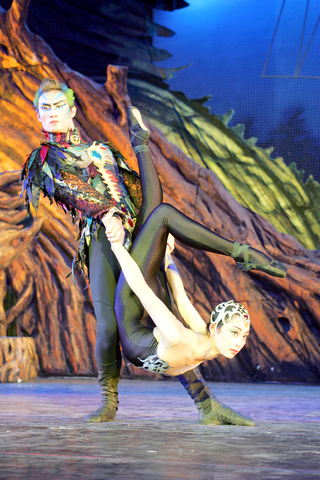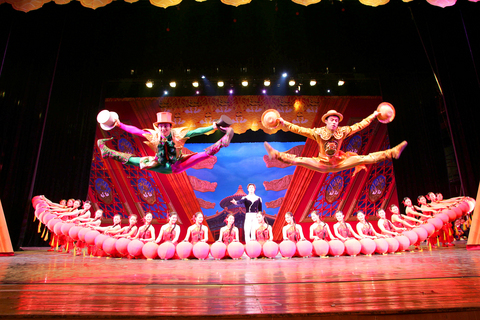In November, a performance of a sensationally popular acrobatic version of Swan Lake in Shanghai was abruptly canceled. Refunds were issued to more than 3,000 ticket holders. And the show's two lead performers were summoned here to the nation's capital.
"We flew to Beijing and arrived on Saturday," said Wu Zhengdan, the female lead. "We knew we were going to perform for someone special. We just didn't know who it was."
That Sunday evening, Wu and her partner, Wei Baohua, performed at a banquet in the Great Hall of the People, one of China's landmark government buildings, for dignitaries who included US President George W. Bush and China's President Hu Jintao (

PHOTOS: NY TIMES
Demonstrating the unconventional blend of classical ballet and traditional Chinese acrobatics they perfected for the new Swan Lake, the delicate Wu, 24, did a pirouette, aloft on the shoulder and outstretched arm of the muscular Wei, 34, who is also her husband. She also rose up, stunningly, on pointe on Wei's head. There followed a gymnastic pas de deux.
Such bravura moves have delighted crowds in China over the past year, helping turn this radical reworking of Swan Lake by the Guangdong Military Acrobatic Troupe into a box office hit and transforming the couple into stars.
Now, the acrobatic Swan Lake featuring Wu and Wei is preparing for a world tour that will include Russia, Japan, Germany, and the US, where the couple already won high praise last October when they took part in the "Festival of China" at the Kennedy Center in Washington.

What audiences will see is not your usual Swan Lake. Although this 19th-century Russian ballet has been a fixture on the Chinese stage for decades, the current version contains several decidedly Chinese twists.
It opens with Prince Siegfried dreaming of a beautiful girl who has been transformed into a swan by an evil eagle, a vision that propels him into a quest that takes him from Europe through Africa, the Middle East, and South Asia before landing him in Beijing -- a journey that provides the acrobatic troupe with ample opportunity for displays of local color. There, in the Forbidden City, he meets the young Chinese swan-woman he will make his bride.
This West-meets-East take on Swan Lake is emblematic of the broad shift under way in China as state-sponsored cultural institutions move toward more market-oriented offerings.
Film producers, dancers, musicians -- even military performing groups -- that long depended on the government for financial support are now aggressively pursuing commercial opportunities. They are seeking private sponsors and hoping to profit by luring bigger audiences at home or exporting cultural extravaganzas to the rest of the world.
Filmmakers, often backed by state-owned production houses, are now trying to make Hollywood blockbusters. Even the monks of Shaolin Temple, famed for their martial arts skills, have gone commercial, forming their own for-profit company to produce kung fu movies and promote the Shaolin brand. The choreographer behind the new Swan Lake, Zhao Ming, says that China's state-run performing arts system is packed with hidden talent waiting to be discovered. "There are a lot of people with great technique here, but because they're in the military troupe, they have less chance to let people know," said Zhao, who also choreographs the Beijing Military Troupe.
Both Wu and Wei are products of a similarly rigid system, the socialist-era sports school programs that are still geared toward producing Olympic champions.

On April 26, The Lancet published a letter from two doctors at Taichung-based China Medical University Hospital (CMUH) warning that “Taiwan’s Health Care System is on the Brink of Collapse.” The authors said that “Years of policy inaction and mismanagement of resources have led to the National Health Insurance system operating under unsustainable conditions.” The pushback was immediate. Errors in the paper were quickly identified and publicized, to discredit the authors (the hospital apologized). CNA reported that CMUH said the letter described Taiwan in 2021 as having 62 nurses per 10,000 people, when the correct number was 78 nurses per 10,000

As Donald Trump’s executive order in March led to the shuttering of Voice of America (VOA) — the global broadcaster whose roots date back to the fight against Nazi propaganda — he quickly attracted support from figures not used to aligning themselves with any US administration. Trump had ordered the US Agency for Global Media, the federal agency that funds VOA and other groups promoting independent journalism overseas, to be “eliminated to the maximum extent consistent with applicable law.” The decision suddenly halted programming in 49 languages to more than 425 million people. In Moscow, Margarita Simonyan, the hardline editor-in-chief of the

Six weeks before I embarked on a research mission in Kyoto, I was sitting alone at a bar counter in Melbourne. Next to me, a woman was bragging loudly to a friend: She, too, was heading to Kyoto, I quickly discerned. Except her trip was in four months. And she’d just pulled an all-nighter booking restaurant reservations. As I snooped on the conversation, I broke out in a sweat, panicking because I’d yet to secure a single table. Then I remembered: Eating well in Japan is absolutely not something to lose sleep over. It’s true that the best-known institutions book up faster

Though the total area of Penghu isn’t that large, exploring all of it — including its numerous outlying islands — could easily take a couple of weeks. The most remote township accessible by road from Magong City (馬公市) is Siyu (西嶼鄉), and this place alone deserves at least two days to fully appreciate. Whether it’s beaches, architecture, museums, snacks, sunrises or sunsets that attract you, Siyu has something for everyone. Though only 5km from Magong by sea, no ferry service currently exists and it must be reached by a long circuitous route around the main island of Penghu, with the